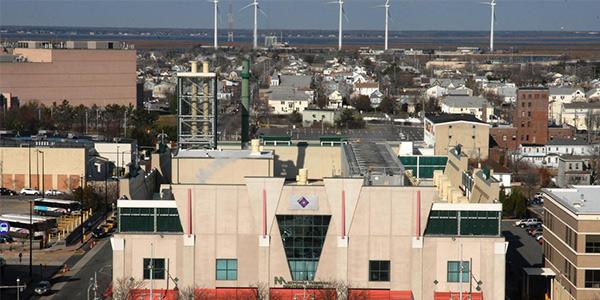Proposed microgrids in Atlantic City and seven other locations took another step toward reality after the New Jersey Board of Public Utilities (BPU) last week approved $4 million in subsidies for the projects.
The Atlantic City project being developed by independent power producer DCO Energy would provide emergency backup power to Caesars Atlantic City Hotel and Casino, Bally’s Hotel and Casino, The Claridge hotel, Boardwalk Hall — best known as the traditional home of the Miss America pageant — local shops and the city’s main hospital.
The project will involve a retrofit to increase the capacity of the Midtown Thermal Control Center, which currently provides heating, cooling and emergency power to casinos and other facilities, to 19.3 MW.
The BPU’s awards were the result of a two-part competition that began in 2017 under the Town Center Distributed Energy Resources Microgrid Design Incentive Program. Besides Atlantic City, subsidies went to Montclair Township, the Borough of Highland Park, Hudson County, the City of Hoboken, Neptune Township, Woodbridge Township and the New Jersey Department of the Treasury on behalf of the City of Trenton. Atlantic City’s $1.1 million grant was the largest award.
The Atlantic City microgrid will involve a retrofit to increase the capacity of the Midtown Thermal Control Center, which currently provides heating, cooling and emergency power to casinos and other facilities, to 19.3 MW. | DCO Energy
The BPU said the eight projects would provide resilience to 24 Federal Emergency Management Agency Category IV facilities (including hospitals, fire and police stations) and 32 FEMA Category III facilities (including educational facilities and other buildings where more than 300 people congregate).
“In addition, they would deploy 10.5 MW of new or existing solar PV generation and 2.9 MW of new or existing battery storage, resulting in over 24,000 tons of avoided CO2 emissions annually,” the BPU said.
New Jersey’s interest in microgrids dates back to 2012 when Superstorm Sandy battered the state. After making landfall with hurricane-force winds near Atlantic City, the storm devastated the Jersey Shore, causing major flooding and power outages that left millions in the dark for days. Public Service Electric & Gas, the state’s largest utility, estimated Sandy did about $300 million in damage to its transmission and distribution system. According to IHS Global Insight, the storm, which also hit New York City, caused as much as $30 billion in property damage, making it one of the costliest natural disasters in U.S. history.
“As the recent events in Texas have reminded us, infrastructure resilience is critical to maintaining reliable energy and utility services in the event of an emergency. We learned this ourselves during and after Superstorm Sandy,” said BPU President Joseph Fiordaliso at the board’s March 3 meeting. “But we are moving in a direction that hopefully will never allow what happened in Texas to happen here in New Jersey.”
Power disruptions in Texas and California have brought new attention to microgrids. ERCOT, the nonprofit manager of Texas’ grid, fired CEO Bill Magness last week after the system nearly collapsed during a winter storm that left millions without power. (See ERCOT Board Cuts Ties With Bill Magness.) In January, the California Public Utilities Commission ordered the state’s investor-owned utilities to offer a $200 million microgrid incentive program to communities at risk of public safety power shutoffs because of wildfires. (See Calif. PUC Orders $200M Microgrid Incentive Program.)
Microgrids haven’t been an easy sell to utilities, which see them as a threat to their traditional monopoly business, according to Guidehouse Insights Research Director Peter Asmus, who tracks the microgrid industry.
“Most microgrids are not deployed by utilities,” Asmus wrote in an email. “As such, they are often not located in ideal locations to bolster the resiliency of the larger grid, though that is changing as microgrids can serve as excellent demand response resources. And given recent outages linked to extreme weather — such as in Texas — the need for greater resiliency is clear. But utilities worry that these microgrids are not directly under their control, could perhaps impact the larger grid if they don’t operate properly, and could result in a loss of revenue. ”
The microgrid would provide emergency back-up power to Caesars Atlantic City Hotel and Casino; Bally’s Hotel and Casino; The Claridge hotel; Boardwalk Hall, local shops, and the city’s main hospital. | Google
According to Adam Benshoff, vice president for regulatory affairs at the Edison Electric Institute, utilities often have problems persuading regulators to allow them to recoup the costs of microgrids in rates.
“They’ve had trouble even getting approval for sort of public purpose microgrids — one that will just keep critical online infrastructure like hospitals, police stations fire stations, things like that,” Benshoff said in an interview. “Sometimes it’s difficult to sell unless you can show real value to the broader customer base.”
DCO acquired the Midtown Thermal Control Center in 2016 from Pepco, the parent company of local utility Atlantic City Electric. According to DCO Chairman Frank DiCola, the biggest challenge facing the company in getting the microgrids established is getting Atlantic Electric to agree to it.
“We need them to work with us in establishing the microgrid,” DiCola said in an interview, adding that he had no reason to expect any problems with the utility company. “But you never can tell,” he added. “We have been talking to them on-and-off for the past couple of years. We want to work in a very cooperative manner with them. They are part of the solution.”
Pepco told NetZero Insider that it was committed to microgrids and other technologies that will bolster the company’s grid reliability,
“As with all projects on our system, we will continue to engage with the project developer and refine this microgrid project to ensure it is in the best interest of our customers and will not affect our ability to provide clean, safe, affordable and reliable energy service for our customers,” it said.



